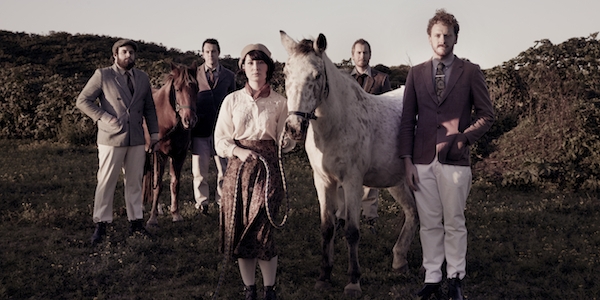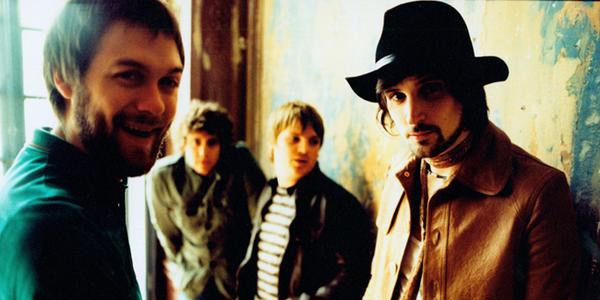“The frame of mind that an artist is in when they’re writing a song is a really raw state of mind, and it’s important to stay in that mode. Songs can come out so perfectly when everyone’s in the moment,” the band’s co-vocalist, keyboardist and occasional guitarist says.
“I’m not one that’s a huge fan of recording the bass and drums one day and then recording the guitars two weeks later. The song has essentially lost its vibe and magic in a way. I’m totally the kind of control freak that when I write a song I’ll have everything worked out – I know all the sounds that I want in my mind. And I won’t want to record it down the track: I’ll want to record it in the now.”
So for someone with this frame of mind, coping with an eight-month recording process for Dead Letter Chorus’s latest album Yearlings must have been like pulling teeth.
Three years after their debut album The August Magnificent, Yearlings is propelling the indie pop five-piece’s profile forward (along with the help of their single Run Wild being used as the latest Toyota advertisement jingle) in the best possible way.
“The recording process was elongated due to us having a Canadian producer [Les Cooper]. We were trying to go between working with him and getting ourselves sorted in the studio. It could have been quicker,” Huber admits. “But we’ve never worked with a producer before and we really wanted someone to help us get a bit of clarity in the songs.”
Dead Letter Chorus met up with Cooper when they toured Canada last year. They completed pre-production with him whilst over there, before flying him out to Australia for two weeks after they had fulfilled national touring commitments. After that, the band completed the rest of the recording themselves.
“We have so much respect for Les because he is a well-known producer and an amazing musician, and we took him on board as a sixth member of the band. We really valued his opinion; it was interesting seeing his take on things,” says Huber.
“It was just great to have another opinion. We’ve been playing together for four years now; we know each other’s style. You can fall into the same sort of rhythms sometimes, so it was good to have someone challenge that and give it that extra dimension. It was challenging though, getting used to somebody pulling things apart, but you just rolled with it because there was that respect there. He knew what he was doing.”
Yearlings, an album with a narrative concept about the ups and downs of a love affair, doesn’t sound like an eight-month labour of love: there is an natural sense of meandering journey about it, a quality that Huber believes that the band has always had, but unable to properly capture until now.
“We’re really unconventional when it comes to songwriting. We like to go on instinct and let the song come out of us in a really natural way. We don’t think too much about structure or conformity,” she says. “With the length of the album I guess it gave us a chance to listen to the ways in which some of the songs were recorded and alter some of those structures, but most of them are pretty much in their original forms.
“The August Magnificent was like that, but on a really exaggerated level. There was the same amount of songs as Yearlings but it was about twice the length. All the songs were a bit more complex, but we don’t mean them to be like that: that’s just the way we are as a band.”
While Huber talks up the instinctive nature of Dead Letter Chorus’ music, she is also more than happy to detail the focused attempt by the band to harness those qualities for a particular purpose. “With Yearlings we consciously wanted to make it a little easier to digest for listeners. We wanted it to be a bit more of an easy listen and for the songs to be a little shorter and a bit sweeter,” Huber explains. “But I think that complexity still comes through in our music, which I don’t think is a bad thing. It’s just who we are.”
And as for the lyrical narrative that courses through Yearlings’ veins, was that something instinctive or a conscious decision? “It was more a case of writing the songs and having them exist as their own identities; they had no relation to one another,” Huber answers. “But when we were trying to put the songs together in a listing for the album pressing, we realised that some of the songs tend to follow this pattern of the ups and downs of love and the journey of a love affair, so the songs subconsciously created this narrative themselves.”
After such a lengthy process getting Yearlings recorded, one would forgive Dead Letter Chorus for wanting to get in the van and be glad to see the back of a studio. But according to Huber, the band is already nurturing the seeds that will one day bloom into album number three.
And for someone like Huber, who prefers to capture the raw magic of a song, she couldn’t be more excited about their desired process for the next time around. “We’d like to do the next one in a few days if we could. We’d really like to pump it out and do it all live,” she says.
Whatever school of thought you belong to, you can’t really argue with that.
BY LINDSEY CUTHBERTSON

